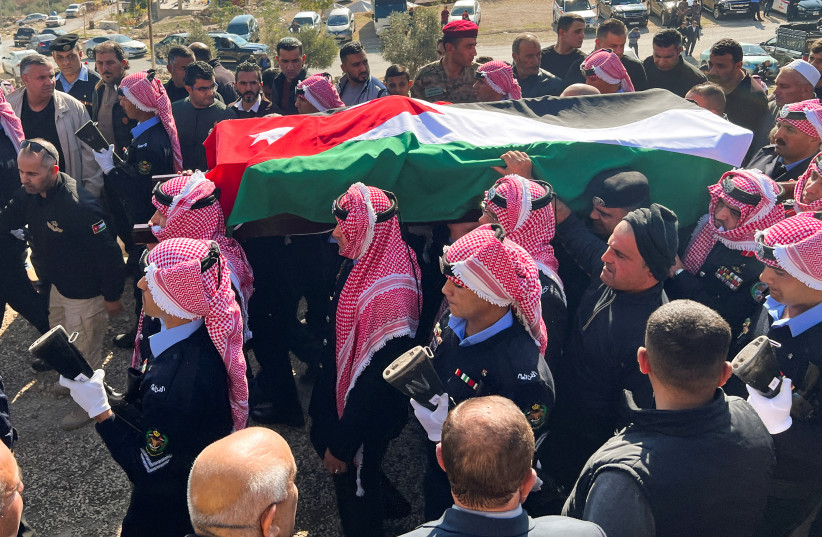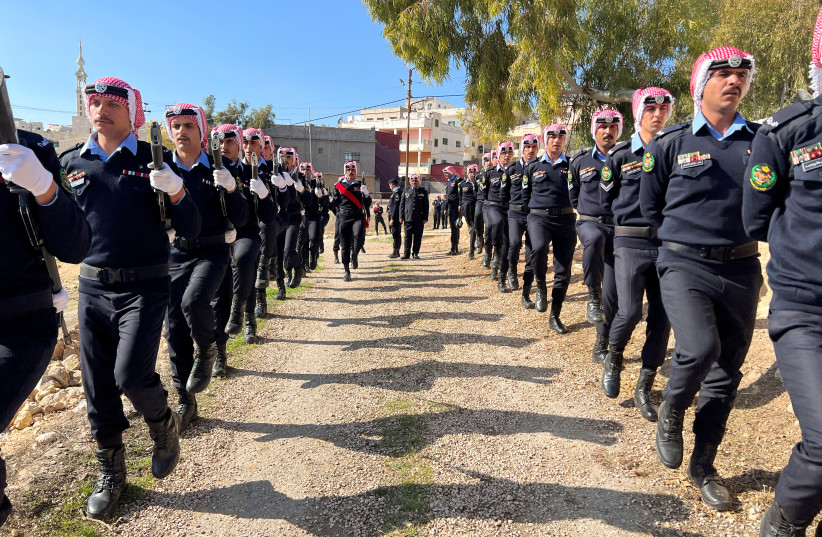by Seth J. Frantzman
Jordan will need to rein in the protests and provide justice to the tribe of the man who was killed as it attempts to once again head off any growth in protests.
 |
Jordanian security personnel carry the coffin of senior police
officer who was killed in riots on Thursday night according to
authorities, in Jerash, Jordan December 16, 2022.
(photo credit: REUTERS/JEHAD SHELBAK)
|
The death of a Jordanian police officer during riots that began with fuel price protests in Jordan appears to represent a rare and violent challenge to authority. The incident took place in the southern city of Ma’an.
“The authorities said the policeman was killed on Thursday night by a gunshot fired by an unidentified individual when armed officers entered a neighborhood of Ma’an to quell riots,” Al Jazeera reported. “Youths had attacked government property in the city.”
The killing comes amid a number of protests in which other members of the security forces have been injured. Many of these incidents appear to have occurred outside the public eye, and it doesn’t seem like the violence is spreading.
Nevertheless, this does indicate a serious challenge for the Kingdom of Jordan, which has tried for many years to keep any kind of protest from spreading. Every year brings new controversies, however, with many of them seemingly rooted in economic challenges.
Jordan has faced decades of economic challenges for a variety of reasons.
Jordan has faced decades of economic challenges for a variety of reasons. The country is mostly landlocked, except for in the south, and it doesn’t have many natural resources. Its economy is tied in part to the Gulf and other monarchies, but it also has a large Palestinian population.
This means that the kingdom not only has a human and economic attachment to the West Bank, but it also has a political attachment and acts to be a custodian of Muslim and Christian Holy sites in Jerusalem. This role means Jordan is often at odds with the Israeli authorities.

The complex position of Jordan also means it has been deeply impacted by the conflicts in Iraq and Syria. While the kingdom once faced challenges from the Muslim Brotherhood, in recent decades it also saw an influx of refugees from Iraq and Syria.
The Syrians eventually came to number a significant percent of the population – about a million people at its height. Some have returned to Syria, but others have stayed in Jordan. Jordan views them in a fraternal way, at least officially, welcoming Syrians from southern Syria who often have some tribal or family links to people in northern Jordan.
But this is a major economic challenge. Western support and support from the wealthier Gulf states isn’t enough for the kingdom. A partnership with Egypt and Iraq is important, and Jordan also can serve as a conduit of trade to Syria.
The Syrian regime, however, is under sanctions and has its own chaotic problems in the south, near the Jordanian border. At the same time, Iranian-backed gangs are involved in the illegal drug trade in southern Syria, and these gangs have clashed with Jordanian forces.
The recent incident in Ma’an is important.
“Gunfire killed a senior Jordanian officer and wounded two other police in the country’s south, where protesters have taken to the streets for days against rising fuel prices, authorities said on Friday,” Washington-based news site Al-Monitor reported. The victim was Col. Abdul Razzaq Dalabeh, deputy police chief of the Ma’an province, who was shot in the head on Thursday. Apparently other security forces were injured by gunshots.
The killing has caused controversy among the Bani Hassan tribe, of which Dalabeh was a member. They want justice, and they have demanded the government follow up. This potentially creates another layer of complexity for the government if it does not act quickly.
The kingdom relies on powerful tribes to support its power, and it opened up a new recruitment drive for the armed forces on Sunday, Jordan’s Al-Ghad daily newspaper reported.
The origins of the recent disturbances relate to a strike over diesel prices, according to Arab News, an English-language daily newspaper published in Saudi Arabia.
“Truck drivers in Ma’an began the protest against rising diesel prices by organizing a sit-in on the desert highway linking Amman and the port city of Aqaba, before colleagues from other regions, including in Amman and Mafraq on the border with Iraq, also joined in,” it reported.
Jordan will need to rein in the protests and provide justice for the tribe of the man who was killed as it attempts to once again head off an escalation in protests.
Seth J. Frantzman
Source: https://www.jpost.com/middle-east/article-725171
No comments:
Post a Comment